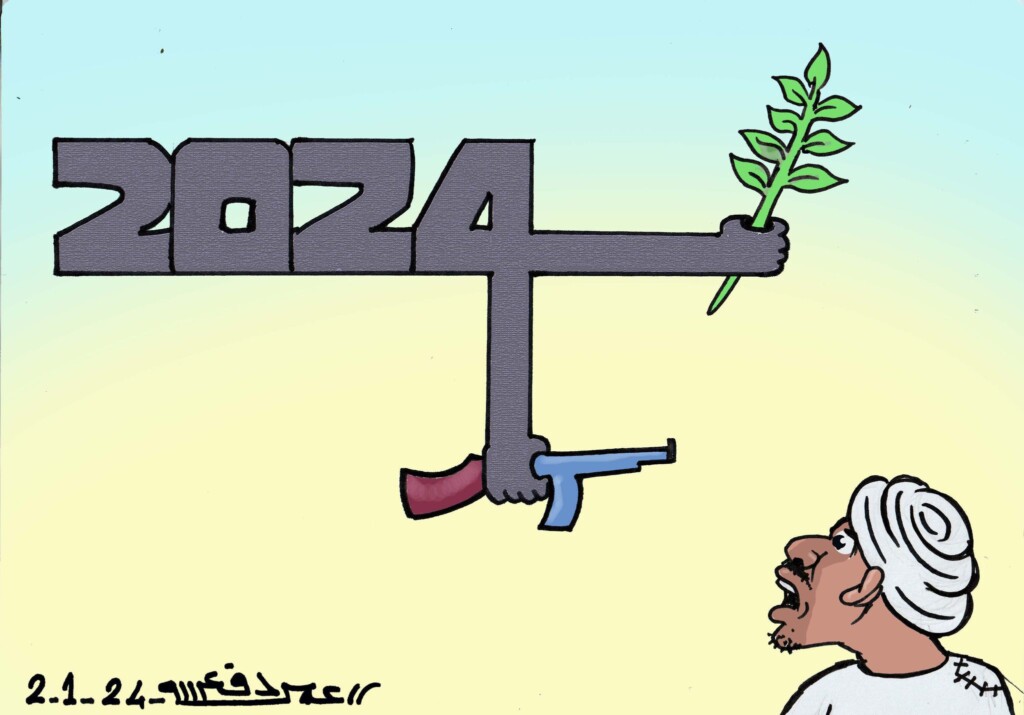Sudan war: Khartoum clashes, El Gezira airstrikes, and humanitarian crisis in Darfur

The new year brings about new peace negotiations, and new bouts of violence (Cartoon: RD / Omar Dafallah)
Battles continued in Khartoum and its sister cities yesterday. In El Gezira, the Darfur Justice Platform condemned the SAF bombing of El Haj Abdallah in El Gezira on Monday. In Darfur, residents and displaced alike continue to face extremely challenging conditions as food, shelter, and telecommunications are unavailable to many.
In the neighbourhoods of Ombadda blocks 51, 52, and 16 in Omdurman, at least nine people were shot dead by paramilitaries of the Rapid Support Forces (RSF), as an RSF unit sought to enter the area on Wednesday. On the same day, a large fire broke out in one of the factories within the popular market in Omdurman.
The resistance committees of Karari in northern Omdurman reported yesterday that the RSF “indiscriminately targeted residents’ homes with random projectiles, resulting in the destruction of a home in El Sawra Block 4” on Wednesday.
Artillery shelling exchanges yesterday also took place between the Sudan Armed Forces (SAF) and the RSF in the vicinity of the SAF General Command in Khartoum, the Signal Corps area in Khartoum North (Bahri), and El Shajara Armoured Corps.
El Gezira
The Darfur Justice Platform strongly condemned the bombing of El Haj Abdallah, 60km south of Wad Madani, the capital of El Gezira, on Monday.
In a statement received by Radio Dabanga, the Darfur Justice Platform expressed its dismay at SAF warplanes “dropping explosive barrels on innocent and defenceless civilians in El Haj Abdallah area of El Gezira, killing and injuring dozens of people”.
Urging an immediate cessation of hostilities, the platform called upon both warring parties to engage in “sincere negotiations” and appealed to human rights organisations to “prosecute those responsible for the appalling massacres that have claimed the lives of thousands of civilians”.
Also in El Gezira, the Humanitarian Aid Commission reported that the RSF “seized a significant stock of medical supplies in El Gezira, originally designated to serve central and other nearby states of Sudan”, adding that the confiscated medical stock, “sufficient for six months and intended for the entire country”, included medications and vaccines “crucial for the well-being of hundreds of thousands of patients, particularly those with chronic and incurable diseases”.
The Commission strongly condemned the actions of the RSF, labelling their behaviour as “barbaric” and accusing them of undermining humanitarian principles towards civilians.
South Darfur
Beleil, South Darfur, is hosting more than 14,000 people displaced from Nyala, the state capital, fleeing violence in the city.
Yesterday, a Beleil community leader expressed concern about the challenging conditions faced by displaced families seeking shelter in the locality, “particularly given the winter weather”. He told Radio Dabanga that families lack warm clothing and urged humanitarian organisations to aid the displaced in Beleil.
Acting South Darfur Governor, Salah Mohamed Ismail, conducted a review of the conditions in Beleil for the displaced. The governor’s visit reportedly aimed to “assess the situation of families who sought refuge in Beleil and to coordinate efforts for the effective functioning of the locality”.
West Darfur
In Jebel Moon, West Darfur, residents are facing food scarcity, attributed to the failure of this year’s agricultural season. Native Administration* emir Hafez El Sheikh highlighted the impact of agricultural pests and premature harvesting on the region’s food production, leading to shortages.
Addressing a public meeting in the area yesterday, Hafez underscored the “prevailing security stability” in Jebel Moon, “thanks to the efforts of social peace committees formed by RSF Commander Lt Gen Mohamed Hamdan Dagalo before the onset of the conflict”. He called upon the state government to “support these committees further by establishing a civil court in the locality and forming joint forces to safeguard the region’s market”.
Residents of Jebel Moon received a visit from the governor of West Darfur, El Tijani El Taher, who toured the locality to assess resident conditions.
“Jebel Moon received a substantial influx of displaced people from El Geneina and Sirba”, the emir emphasised, stressing the urgent need for humanitarian aid especially since Jebel Moon “was excluded from surveys conducted by humanitarian organisations present in Chad”.
The locality is facing a myriad of challenges, including a lack of health services and scarcity of drinking water for both humans and animals, Hafez said. “Most water sources are dry due to the absence of rain during the fall season, coupled with the irregular maintenance of pumps owing to a shortage of spare parts.”
North Darfur
The Zain telecommunications network in North Darfur was restored in El Fasher after a prolonged interruption lasting several weeks, according to local sources.
The community had experienced a total loss of communication, relying solely on the Starlink network**, which became operational in many states of Darfur following the complete shutdown of internet and communication services due to fighting in the region.
El Fasher residents expressed their joy at the network’s return. Intisar Hamed, a local listener, said that the Zain network service resumed on Tuesday after weeks of disruption. “However, the service remains subpar, slow and inefficient.”
Meanwhile, in South, Central, and West Darfur, residents continue to grapple with communication interruptions, compelling them to turn to the Starlink network. However, this alternative is deemed weak compared to other communication networks and incurs high costs, ranging from SDG 2,000 to 5,000 per hour.
* The Native Administration was instituted by British colonial authorities seeking a pragmatic system of governance that allowed for effective control with limited oversight by the state. The state-appointed tribal leaders were also responsible for executing policies, collecting taxes, and mobilising labour on behalf of the central government. According to the Darfur Bar Association (DBA), the Native Administration during the 30-year rule of dictator Omar Al Bashir did not represent the real community leaders.
** Starlink is a satellite-operated internet network provided by American aerospace company SpaceX, headed by Elon Musk (source: Starlink).








 and then
and then